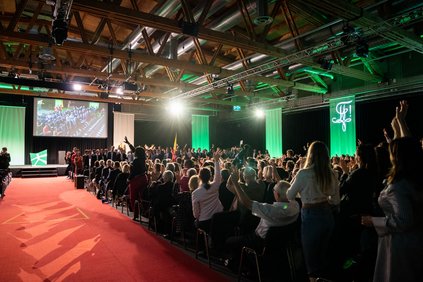Campus - 25.10.2013 - 00:00
Job swap experiment
HSG Professor Miriam Meckel and Res Strehle, editor-in-chief of the Swiss daily newspaper "Tages-Anzeiger", swapped jobs for a week. Even if neither was able to completely replace the other, both took important questions for their everyday work with them. <br/><br/>
For Res Strehle, the first day of the job swap week started with a lecture to 40 students on “Media and communication management”. What came as a surprise for the students was the fact that the "Tages-Anzeiger" editor started his journalistic career with the student magazine "Prisma".
Convergence project on the timetable
Strehle imbued the lecture, which is usually given by Prof. Miriam Meckel, with practical relevance by presenting the concept of the convergent editors’ office of the "Tages-Anzeiger", where all the journalists, regardless of whether they work in print or online, work together in one single newsroom and report to an editor-in-chief. This modus operandi was defined in the “Chelsea Declaration”, which came into being in the eponymous district of New York. These insights into practice were what distinguished Strehle’s teaching from a normal lecture.
In the seminar about the “Human Machine”, which he held the following day, Strehle took the linkage between practice and theory very seriously. Time and again, he supplemented case studies about previously discussed theories by Orwell, Huxley and Baudrillard. He talked about “faction” cases, where journalists published invented stories, and provided insights into the selection of online articles. Thus not all articles which are frequently clicked online are relevant to the printed version of the daily paper.
Later, he was impressed by the discussion which the “Human Machine” topic sparked off among students. The most intensive part of the discussion was about the question as to whether we lose our individuality through the social media or if precisely the opposite is the case.
And although he was only a “substitute professor” for a week, his consultation hour, which he regularly offered like Miriam Meckel, was booked up at once. A practitioner’s opinion about research projects and business ideas was evidently in great demand among students.
IT breakdown as a trial by fire
Prof. Miriam Meckel spent the week in the "Tages-Anzeiger’s" editors’ office, where she participated in the daily editors’ meetings as editor-in-chief and wrote a commentary on the SRF documentation on the Swiss, “Die Schweizer”, on the very first day.
On Tuesday evening, Miriam Meckel then experienced an incident that had never before taken place in the 120-year history of the "Tages-Anzeiger". Owing to an IT breakdown, it was uncertain whether the paper would appear the following morning. Relief came at 1.30 a.m. when the computers were running again and the issue could be completed, even though in a reduced form. For Meckel, this was the baptism of fire, which she rode out right to the end.
The highlight of the week was the paper’s Saturday edition, which was intended to bear Meckel’s hallmark and be completely devoted to the topic of “Digital Life”. The editors were pleased to be able to introduce ideas that were not in line with the "Tages-Anzeiger’s" usual policies, and so the issue bridged the gap between the analogue and digital worlds with QR codes accompanying every article.
Valuable insight into theory and practice
Both Miriam Meckel and Res Strehle emphasise that of course neither was able to replace the other completely, which could not have been the point of the job swap for a start. Rather, the focus was on observing and on learning from each other’s jobs. Thus Miriam Meckel writes: “I took on board many questions and suggestions during the 'Sesseltausch' which will continue to occupy me. One of them is: how dependent have we become on the web by now?”, while Res Strehle recommends that his colleagues should also do a job swap. This “extends one’s horizon in the best possible sense and may help us narrow the gap between academia and practice.”
More articles from the same category
Discover our special topics











